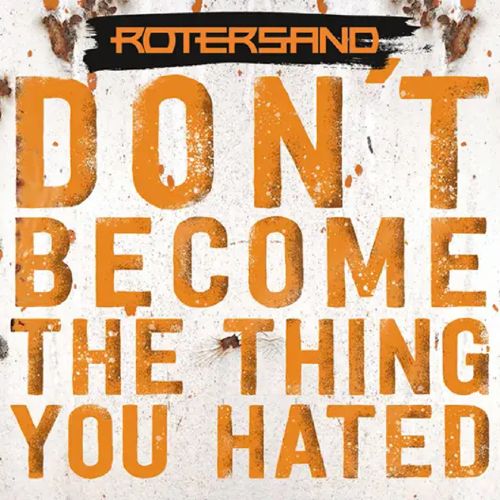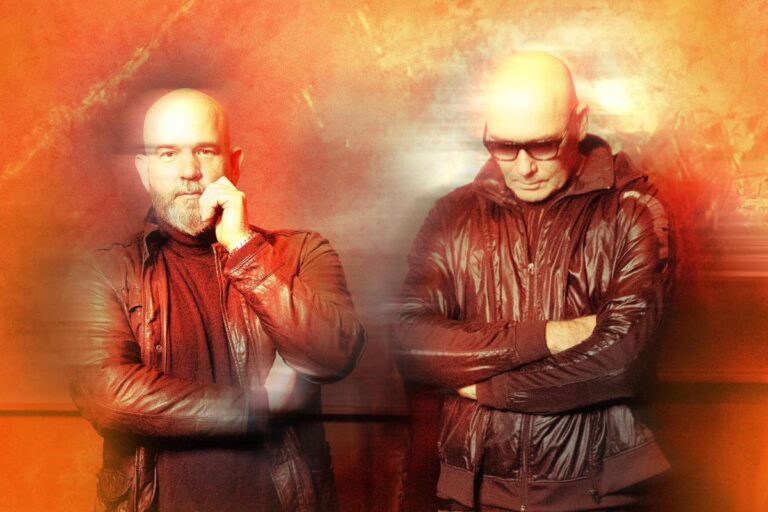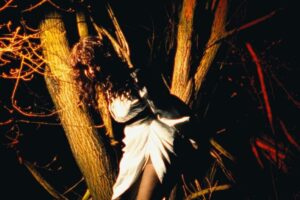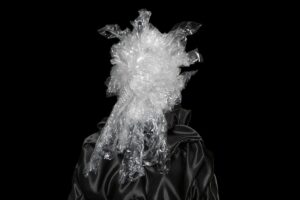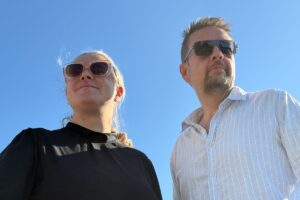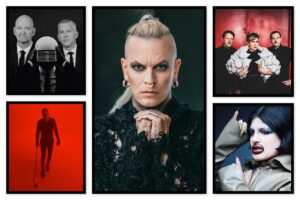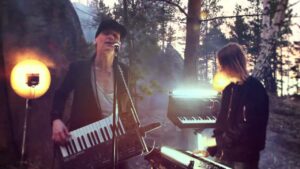Rotersand has always been a band that makes you move and think in equal measure. The beloved German duo—Rascal Nikov and Krischan Jan-Eric Wesenberg—blend intricate electronics with sharp social commentary, creating music that feels both urgent and timeless.
In early 2020, they released their sixth album, How Do You Feel Today?, just as the world shut down due to the COVID-19 pandemic. Songs like “Hot Ashes” and “Whatever” were built for dancefloors but arrived during a moment of global upheaval and isolation. In the years since, Rotersand have trickled out singles like “Forgotten Daydreams,” with its relentless trance pulse, and last month’s “Private Firmament (I Fell for You),” full of frenetic energy.
Now, Rotersand is back with a new full-length. Don’t Become the Thing You Hated, out August 8, is a hard-hitting, emotionally dense record that explores themes of resistance, self-awareness, and the tension between ideals and action.
I reached out to Krischan to talk about the new album, the band’s defiant sound, and what gives him hope.
Your last album, How Do You Feel Today?, came out just as COVID-19 shut down the world. I remember wanting to dance to songs like “Hot Ashes” and “Whatever,” but all the clubs were closed. Do you feel like that album got overlooked? How did isolation impact you—personally and artistically?
We never asked ourselves whether the album got overlooked or not. It’s an interesting question. As the ones who made the album (which had been finished months before its release), we of course realized that its release date was set exactly on the weekend when, at least in Germany, all concerts and club nights came to an abrupt stop. We were more curious about how our album—as well as other artists’ work in any form—would reach and resonate with an audience given the circumstances.
Regarding music, we think that the availability of music through digital services helped people stay connected to their (sub)cultural identity. And the sociability, collectiveness, and sense of community in things like Twitch DJ streams was an astounding experience. It did not replace a club night or concert, but it added something new and soothing for us.
The title of your new album, Don’t Become the Thing You Hated, feels like a warning—and a very personal one. Are there specific experiences that inspired the title?
It’s not meant as a warning—that would put us in a superior position to give advice or something like that. It’s more of a request to self-reflect and keep an eye on your own doing, thinking, methods, or values—especially when you are feeling provoked or enraged.
The title is a call to resist the cycle of reactionary behavior, to keep true to your ideals without replicating the repression or exclusion you once opposed. We should not fight fire with fire.
There is no authoritarian way to oppose authoritarianism, for example. And yes, we are very aware of Popper’s tolerance paradox.
Resistance has long been central to your work, and Don’t Become the Thing You Hated adds a new layer by urging us to resist without losing ourselves. What do you think are the most dangerous elements we should be resisting today?
As stated above: authoritarianism, bipolarity, and the latent refusal of a better future worth working for—and getting stuck in the status of the present.
One of the things I love about Rotersand is your use of unexpected sounds—like the wild Renaissance horns on “You Know Nothing” and what sounds like a rumba breakdown on “Private Firmament (I Fell for You).” Where do those sonic ideas come from? How do you know when something is a good fit for Rotersand?
We don’t know whether those elements fit or not. As we are Rotersand, technically everything we do and release somehow fits into Rotersand by default. Although we realized at some point that Rotersand itself is something like an entity—with kind of a personality, experience, character, and age. It sometimes feels like we are discussing stuff with this band-child we raised ourselves.
As we do have, as you say, a history of using and incorporating “unexpected” sounds, all of us got used to that. It is now part of Rotersand to think and search outside of the genre-specific sound-color palette to transmit a message or emotion. Thanks for acknowledging that.
Your live performances are rarer these days. Are you planning to tour or play shows in support of Don’t Become the Thing You Hated? Any chance you’ll come back to the States?
As much as we love to perform live, we have been kinda selective about which shows to play throughout the existence of Rotersand. Yes, we are definitely gonna play shows in support of the album, and we would love to come to the States again. It was actually very close this year.
Performing in the States as a European act isn’t too easy nowadays, given the costs for work visas and increased travel costs—especially after the pandemic. And as we are professionals making a living from music, we need to keep an eye on at least not losing money and on how to cover those costs upfront. It sounds harsh, but that’s part of the reality we are facing.
But we are working on it. We actually had worked and were rather far into the preparation for U.S. dates when the pandemic hit.
There’s a line in the press notes for Don’t Become the Thing You Hated about encouraging “inner vigilance” and rejecting forces that erode empathy. That’s a powerful message—what gives you hope these days?
Hope is kind of a cycle for us, too. When you are having hope—not in terms of expectation—you are receiving hope.
To be hopeless means to already dislike the future, to put the present above the future, to stop any kind of progress in your thoughts—and likely in your actions, too. To not have hope means to give up your own power to change something, to shape a tomorrow to look forward to.
Empathy is a power of hope for us. Empathy opens you up to someone else’s feelings, perspectives, thoughts, and ideas. Empathy is inspiration. Inspiration is future. Future is hope.
